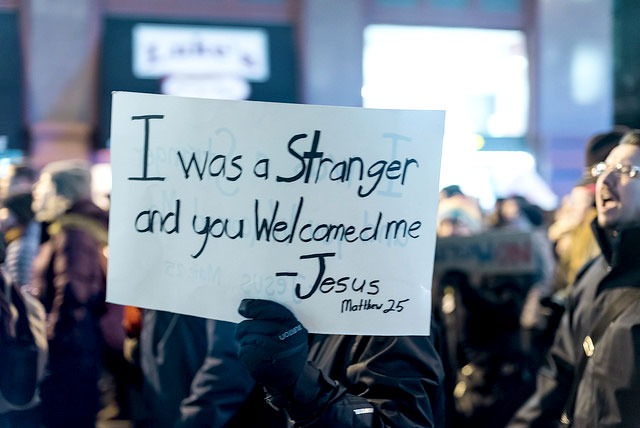
Thousands of faith leaders are activating and rising to the moment around the idea of sanctuary for those targeted by Trump’s regime. From airport protests to local organizing around elected officials, we are bringing our prayers, hands and communities into the fight against the massive attacks we are living through.
It is crucial for religious groups to consider community defense strategies that align with our deepest spiritual values. But we must also do this work inside a context of how we got to this moment, and what responsibility in this moment looks like for those of us in faith communities that are not being targeted, as well as those of us in faith communities that Trump claims he represents. In my work with Unitarian Universalists nationally, I see everyday how much these communities are working to engage in progressive social change.
Trump has claimed that his new ban on Muslims is about protecting the US from terrorists, but we know better. Moreover those of us who are part of faith communities know we have to ask ourselves what our role will be in the resistance to Trump’s attempts to employ conservative Christian leaders (in particular) as generals and ground troops in his army against Muslims, against immigrants and against LGBTQ communities.
This week, former Arizona Gov. Jan Brewer said, in response to the Muslim ban: “People in America want to be safe.” Like so many of Trump’s cronies, she echoes the zero-sum game message: in order for white, straight Christians and conservatives to be safe, some people will have to be banned, some deported, others silenced, and some dead.
We already know that Trump’s vision of “making America great again” is a project that requires those who have been painted as foreign, as dark, as queer, or as non-Christian to be removed. Removed physically, removed as priorities, as people with voices and bodies and real families with needs. Removed from the stories and narratives of who lives and who matters in this country.
Liberation projects in our time require those of us painted as outsiders and as “the other” to rise up and claim our lives as our own, to be determined by us. But, they also require our neighbors who are cast as insiders to rise up, resist and transform this moment. The Trump administration has named Christians, white people, straight people and those of us who are not trans as its insiders — so all of these groups bear a particular responsibility to oppose the banning of whole communities based on religion and on racism.
I think of what I have learned from my friends at Iraq Veterans Against the War as they have risen up for their own humanity as vets, and as part of progressive movements. They are dangerous to a far-right agenda because they have defected from systems of killing and false notions of security. I have a deep respect for what they do.
Christians and others who are being painted as inside Trump’s circle of protection must do the same in this moment. We need the white Christians whom Trump is claiming to “protect” to say, “Not in our name, or in the name of false illusions about our safety.”
Trump and the religious right are giving us profoundly false notions of what the role of religion and faith should be in our lives and our political landscape. The real role of spirituality in our time, in my mind, is the ancestral and current connection to life’s deepest meaning, to our covenant with each other, to our hope for spiritual and embodied salvation for all of us, no matter how marginalized.
So, what can we do? Across the country, in towns like Chicago, Phoenix, Nashville, Louisville and Atlanta, Black and Brown communities are uniting forces to wage local campaigns demanding mayors support an expanded and intersectional definition of sanctuary. In the coming weeks, many communities will begin building Community Defense Zone campaigns that will work to protect those targeted by widening the circle of who is organized through deep outreach. Thousands of faith communities are wrestling with how to use their buildings and space to support sanctuary and community defense work. More work is surely emerging as I write this. Our opportunities to do the soul work needed are all around us.
Join us in defending the truth before it’s too late
The future of independent journalism is uncertain, and the consequences of losing it are too grave to ignore. To ensure Truthout remains safe, strong, and free, we need to raise $43,000 in the next 6 days. Every dollar raised goes directly toward the costs of producing news you can trust.
Please give what you can — because by supporting us with a tax-deductible donation, you’re not just preserving a source of news, you’re helping to safeguard what’s left of our democracy.